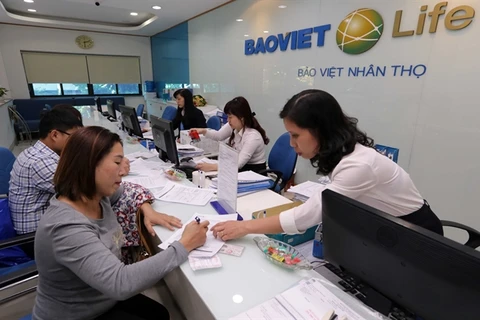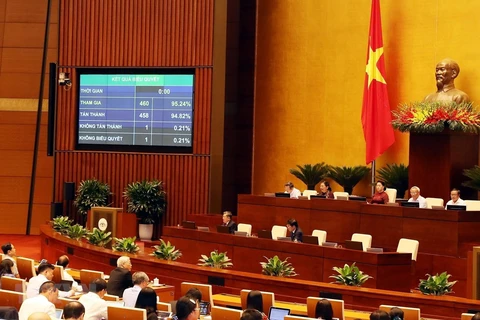Hanoi (VNS/VNA) - Economists have said Vietnam would gain many benefits from a full and modern market economy.
“The local economy is now owned and controlled by the State, so it is not yet a market economy,” said Nguyen Dinh Cung, former director of the Central Institute for Economic Management (CIEM) at the seminar “Dialogue on Vietnam’s market economy institutions” held by the National Economics University and CIEM in Hanoi on July 29.
Cung pointed out that the country has been on the path to become a market economy for the last 30 years, adding: “I hope the path will end soon."
He said the State’s ownership is transferred very slowly, while economic management must be run by the market not the State. He suggested the State should run the market in necessary areas and give space for a market economy.
He considered the level of market development of the economy and the effectiveness of the Government as two indicators of a good market economy but he said: “These indicators in Vietnam are not good.”
Cung said there should be a balance between the managing role of the State and the market, emphasising that "the market economy might not solve all the problems of the economy, but without it, our economy will fail."
Economist Pham Chi Lan said there were resolutions and documents to build a market economy in Vietnam but, for years, they have been struggling to remove barriers.
She said though the local economy has state-owned enterprises (SOEs), FDI enterprises and private enterprises, SOEs and FDI enterprises still had the upper hand in policies and incentives.
Lan said: "In the current GDP structure, the private sector contributes less than 10 percent,” meaning the low ratio of private sector participation could not help build a market economy.
Economist Le Dang Doanh said though 90 countries have recognised Vietnam as a market economy, according to the evaluation of the US and the European Union, Vietnam does not have one.
To be recognised, he suggested the country step up the removal of barriers in institutions and the Government should not intervene deeply into the economy but only hold ownership in some crucial industries.
Doanh said if so, the economy will gain many benefits, while many procedures will be reduced to help local businesses cut costs.
Fred McMahon, from Canada’s Fraser Institute, said that Vietnam has a remarkable economic growth record, adding that economic freedom would help create momentum for growth to overcome the middle-income trap.
At the seminar, experts said Vietnam should build the economy based on an international set of indicators, similar to how it developed the business environment according to the index of the World Bank and the World Economic Forum.
Tran Tho Dat, president of the National Economics University, said: “It is time to pay attention to the indicators of economic freedom as a measure of the full development of Vietnam’s market economy, especially for Vietnam to overcome the low average development threshold.”/.
“The local economy is now owned and controlled by the State, so it is not yet a market economy,” said Nguyen Dinh Cung, former director of the Central Institute for Economic Management (CIEM) at the seminar “Dialogue on Vietnam’s market economy institutions” held by the National Economics University and CIEM in Hanoi on July 29.
Cung pointed out that the country has been on the path to become a market economy for the last 30 years, adding: “I hope the path will end soon."
He said the State’s ownership is transferred very slowly, while economic management must be run by the market not the State. He suggested the State should run the market in necessary areas and give space for a market economy.
He considered the level of market development of the economy and the effectiveness of the Government as two indicators of a good market economy but he said: “These indicators in Vietnam are not good.”
Cung said there should be a balance between the managing role of the State and the market, emphasising that "the market economy might not solve all the problems of the economy, but without it, our economy will fail."
Economist Pham Chi Lan said there were resolutions and documents to build a market economy in Vietnam but, for years, they have been struggling to remove barriers.
She said though the local economy has state-owned enterprises (SOEs), FDI enterprises and private enterprises, SOEs and FDI enterprises still had the upper hand in policies and incentives.
Lan said: "In the current GDP structure, the private sector contributes less than 10 percent,” meaning the low ratio of private sector participation could not help build a market economy.
Economist Le Dang Doanh said though 90 countries have recognised Vietnam as a market economy, according to the evaluation of the US and the European Union, Vietnam does not have one.
To be recognised, he suggested the country step up the removal of barriers in institutions and the Government should not intervene deeply into the economy but only hold ownership in some crucial industries.
Doanh said if so, the economy will gain many benefits, while many procedures will be reduced to help local businesses cut costs.
Fred McMahon, from Canada’s Fraser Institute, said that Vietnam has a remarkable economic growth record, adding that economic freedom would help create momentum for growth to overcome the middle-income trap.
At the seminar, experts said Vietnam should build the economy based on an international set of indicators, similar to how it developed the business environment according to the index of the World Bank and the World Economic Forum.
Tran Tho Dat, president of the National Economics University, said: “It is time to pay attention to the indicators of economic freedom as a measure of the full development of Vietnam’s market economy, especially for Vietnam to overcome the low average development threshold.”/.
VNA
























